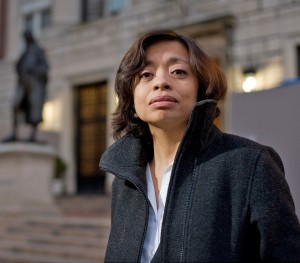Peace and journalism were in the spotlight last week with news involving two Filipino women.
They’re also sisters.
The first came from New York where veteran journalist Sheila Coronel was named academic dean of the Columbia Journalism School, considered the top J-School in the US. It was wonderful news that made many of us who’ve known Sheila for years proud.
Then a few days later, it was her sister’s turn.
Miriam Coronel-Ferrer, known as Iye, is head of the Philippine government panel that’s been negotiating a peace agreement with the Moro Islamic Liberation Front.
It’s one of the toughest jobs in government. But last week, Iye’s team helped the country take an important step toward ending the war in the south.
The final set of documents signed by both sides made official the comprehensive peace agreement the government and the MILF have been hammering out for months.
Finally, peace may finally reign in a Muslim Mindanao, a region that many Filipinos have long associated with insurgency and violence.
Of course, the Coronel sisters each face big challenges, perhaps the toughest of their careers.
Let’s start with Sheila, whom I worked with when she was still head of the Philippine Center for Investigative Journalism.
Journalism is still reeling from a painful transition in the US that has also forced US J-Schools to seek new directions. The Web dramatically changed the US and global media, opening up new ways to tell stories and reach broader audiences.
But it also has disrupted news organizations, particularly newspapers, and the US journalism profession as a whole. The rapid shift of advertising dollars to the online world led to the collapse of a business model that had sustained the mainstream media for decades.
Hundreds of journalists, including many veteran reporters, photojournalists and editors, have lost their jobs — including some friends of mine.
I went to the UC Berkeley J-School in the early 1990s when the path to a journalism career was fairly well-defined. There were also many well-paying jobs, even for beginning reporters and photojournalists.
That’s no longer the case.
The uncertainty is underscored by discussions on my J-School’s online forum on a key question: Is going to J-School worth it these days?
Tough question.
But in some ways picking Sheila to help lead the Columbia J-School is an inspired choice.
DEAL SIGNED Government peace panel chief negotiator Miriam Coronel-Ferrer shakes hands with Moro Islamic Liberation Front chief negotiator Mohagher Iqbal after the signing of the last annex to the Bangsamoro framework agreement on the fourth day of talks in Kuala Lumpur, Malaysia. With them are Presidential Adviser on the Peace Process Teresita Deles and Malaysian facilitator Tengku Dato’ Ab Ghafar Tengku Mohamed. INQUIRER FILE PHOTO
Columbia hired Sheila to lead an investigative reporting center after being impressed by her record as a reporter and head of the PCIJ. Under her leadership, the PCIJ became internationally known for groundbreaking investigative reports. Take the group’s reporting on the corruption under and the secret mansions of Joseph Estrada which helped trigger his downfall.
Betting on Sheila to run the Stabile Center for Investigative Journalism paid off for Columbia. Now the J-School, as it defines a new path in a changing media landscape, is turning to a Filipina with a proven track record both as a journalist and media pioneer, and who honed her skills in a different part of the world, a country with a rich journalism tradition.
It’s a bold move for an institution that has sometimes been accused of being too US-East Coast-focused and at a time when many big stories are global, from climate change to terrorism to corruption.
Columbia J-School Dean Steve Coll, who called Sheila a “superb journalist, teacher and leader,” even took note of how she “established herself as a media leader through her service to groups working to advance investigative journalism worldwide and to protect reporters under pressure. “
The challenges Iye faces are even more daunting.
Mindanao peace deals have been known to fail. In fact, the MILF peace agreement nearly got derailed by the Nur Misuari-led uprising in Zamboanga last year.
This war has raged for so long it wouldn’t be surprising if there are players looking to wreck the process — from rebel forces and rogue military elements that simply cannot imagine or refuse to accept a peaceful Mindanao, to trapos who see peace as a threat to their power.
But the good news is the process led by Iye and Chief MILF negotiator Mohagher Iqbal has won praise for boldly taking on some historically tough issues, including the future of the MILF’s military wing.
And Iye’s team even managed to overcome worries that her gender could be a serious hurdle in negotiating with an all-male MILF panel.
As she told Bloomberg in December, “In the beginning, it was a stumbling block but that has been overcome. Let’s just say it creates a different dynamic.”
Despite that dynamic, the process moved forward. But Iye is aware of the challenges. At the signing of the agreement in Kuala Lumpur, she spoke of the “bigger challenge ahead, which is the bigger challenge of implementation.”
But she can at least count on the support of one person, the new academic dean of the Columbia J-School.
“Peace at last!” Sheila posted on her Facebook page Sunday. “Good news from the home front. Cheers to both panels and special toast to my sister, Miriam/Iye, who worked long and hard to help make this happen.”
Visit (and like) the Kuwento page on Facebook at www.facebook.com/boyingpimentel
On Twitter @boyingpimentel


